
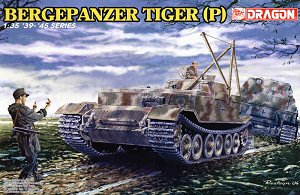
Bergpanzer Tiger (P)
Dragon Kit No. 6226
1/35th Scale
First Look Review by Terry Ashley


The kit parts are in the same light grey plastic with sprues from the three
previous kits (A, B, E, F, G, H, K and Y) with two new sprues L and N for the
new kit plus two frets of etched metal, 1 new and 1 from the Tiger (P), two
lengths of twisted wire from the Tiger (P) for realistic tow cables and three
lengths of fine chain for the jib boom and the same set of full length vinyl
track
in
the glueable
DS100 plastic and a small decal sheet and the line drawing instructions.
Added to this is sprue ‘a’ from a previous StuG III kit which includes
the upper superstructure, gun and other StuG details but all you use is the
remotely controlled MG34 and shield and along with all but 4 parts from sprue
A, 15 from sprue B and 6 from sprue Y the rest is consigned to your ever
expanding spares box.
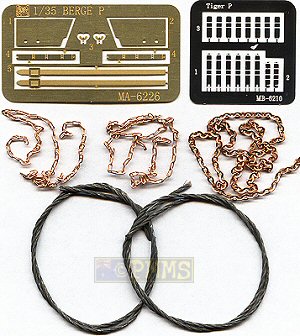
The parts are again cleanly moulded and have a nice level of detail with well defined weld seams on the armour plates and on the upper engine deck and separate rear superstructure with a minimum of pin marks due to the now usual “nodes” on the parts.
The Hull:
The large lower hull tub is a robust mounding that includes the lower tub and
upper hull side sponson panels with reinforcing fillets on the insides to
ensure the side panels remain vertical, as they are but you will have to
remove the four large conical rivet heads on the rear of each hull side and
some other details which are all indicated in the instructions.
The suspension consists of the three suspension units per side with two sets of road wheels each and the details on the road wheels is quite good but the contours of the wheel with raised centre hub should be slightly more curved than the straight hub depicted on the kit wheels.
The toothed drive and idler wheels have the correct variation in hub details
with twelve hub bolts on the idler and only six on the drive sprocket and the
open bolt holes on the outer drive sprocket disc and the correct nineteen teeth
on each sprocket.
The outer sprocket disc on each wheel also has the bolt head details on the
inside as does the inner drive sprocket disc for good detail appearance.
The vinyl track from the Tiger (P) kit is very flexible with excellent details inside and out and glues together using normal plastic cement to make things easy and also fit precisely around the sprocket teeth and should look good on the final kit.
The Bergpanzer Tiger(P) doesn’t have the additional frontal armour of the other vehicles and includes a separate driver’s outer visor and blanked off MG port on the front hull plate.
The large full length fenders need some holes opened up for different fittings on the late production model before attaching to the hull so check the instructions carefully.
The large single piece upper hull has separate front crew hatches with detail on both sides minus any pin marks as well as cut-out engine deck grills and you also get alternate parts for the early production and later production style engine deck details, with other alternate parts being the front fender supports for the later style as well as other minor detail differences and you should determine which version you are building early on as some alterations to the parts are needed depending on your choice.
Other details include a six part jack, front and rear hull towing shackles
and spare track rack on the front hull plate.
The Superstructure:
The new superstructure is a single angled moulding with nice weld seam details
on the sides and top and also has separate upper circular hatch and rear
Panzer IV style turret hatch as well as the front panel machine gun mounting.
Other superstructure details include a separate rear ventilator, lifting hooks
on each corner and separate handles and latches on the hatches with the fit
of the superstructure to the upper hull being very precise without any gaps.
There is also the top mounted remote controlled MG mount similar to that on
the Hetzer with a nicely moulded MG34 and a choice of plastic or etched shields
but there is still some debate as to if these MG mountings were actually fitted
to serving Bergpanzers (P)s?
The large jib boom has the three pyramid frames that fit into brackets on the hull and the jib swing arm as well as being provided with a single moulding of the booms folded and stored across the hull in front of the superstructure to give a choice of final layout. The details on the jib parts is nicely done with fine details on the pulleys and brackets as well as only very small moulding seams on the boom arms, eyes and hooks and overall the cleanup of these parts will be very easy.
The jib frame brackets and pulleys are all in two or more parts each and if you assemble these carefully they will be able to operate after assembly and the supplied chain is threaded through the pulleys and attached to the hooks and eyes to finish off the assembly, the instructions give a ‘thread’ diagram for the chain to make this fairly easy to accomplish.
Decals:
The small instruction sheet gives basic markings for two early production and
two late production Bergs as follows;
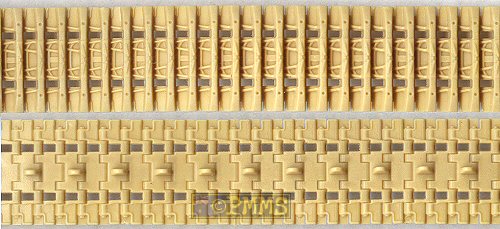
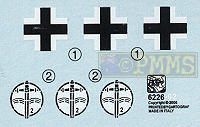
Conclusion:
Overall another nicely detailed kit with the new upper superstructure and jib
booms being well done with the fine workable jib assemblies allowing any
number of jib positions for good animation. Most of the details appear to
match available data and the choice of early or late production versions
adds further choice and will be a good combination with any of the previous
Ferdinands, Elefants, Tiger (P)s in a diorama setting even if you do need
to add zimmerit to the late production types.
Highly recommended for German fans looking for that something different.
Click on thumbnails for larger view







Detail images

Close new window to return to review
References:
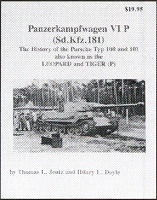
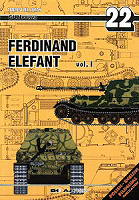
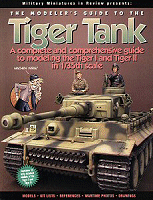
Page created 23 March 2005